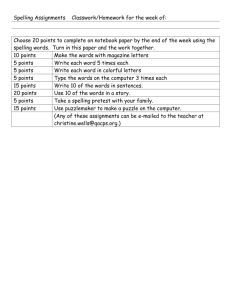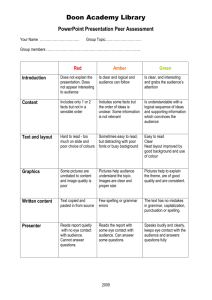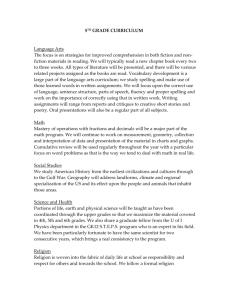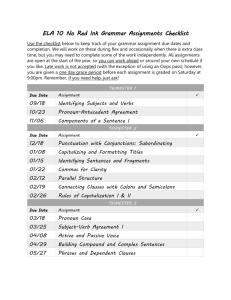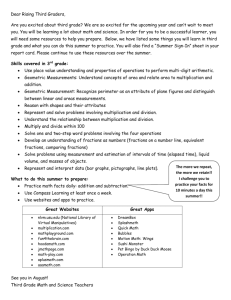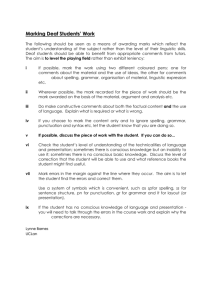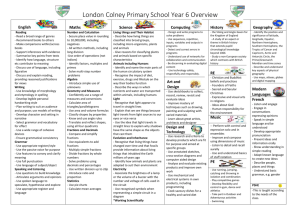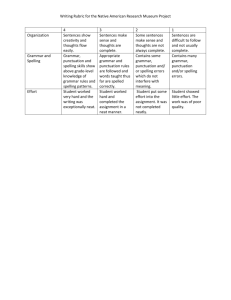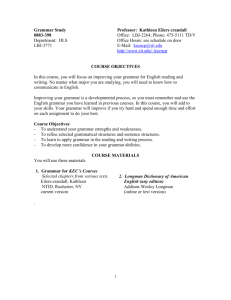Fourth/Fifth Grade Curriculum
advertisement
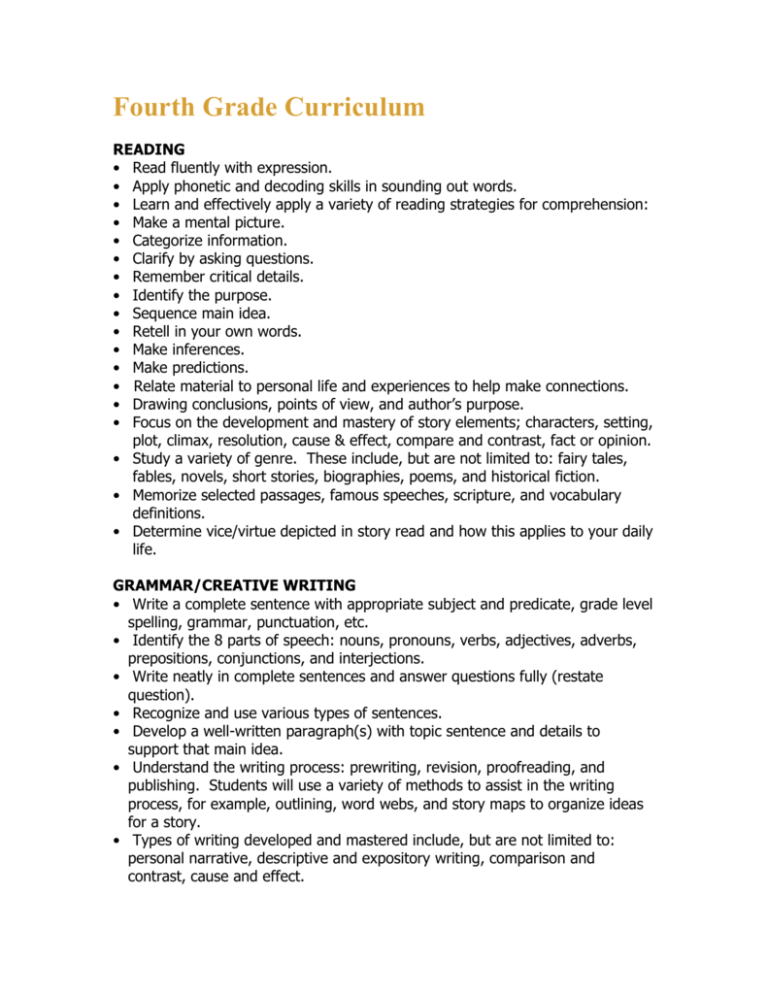
Fourth Grade Curriculum READING • Read fluently with expression. • Apply phonetic and decoding skills in sounding out words. • Learn and effectively apply a variety of reading strategies for comprehension: • Make a mental picture. • Categorize information. • Clarify by asking questions. • Remember critical details. • Identify the purpose. • Sequence main idea. • Retell in your own words. • Make inferences. • Make predictions. • Relate material to personal life and experiences to help make connections. • Drawing conclusions, points of view, and author’s purpose. • Focus on the development and mastery of story elements; characters, setting, plot, climax, resolution, cause & effect, compare and contrast, fact or opinion. • Study a variety of genre. These include, but are not limited to: fairy tales, fables, novels, short stories, biographies, poems, and historical fiction. • Memorize selected passages, famous speeches, scripture, and vocabulary definitions. • Determine vice/virtue depicted in story read and how this applies to your daily life. GRAMMAR/CREATIVE WRITING • Write a complete sentence with appropriate subject and predicate, grade level spelling, grammar, punctuation, etc. • Identify the 8 parts of speech: nouns, pronouns, verbs, adjectives, adverbs, prepositions, conjunctions, and interjections. • Write neatly in complete sentences and answer questions fully (restate question). • Recognize and use various types of sentences. • Develop a well-written paragraph(s) with topic sentence and details to support that main idea. • Understand the writing process: prewriting, revision, proofreading, and publishing. Students will use a variety of methods to assist in the writing process, for example, outlining, word webs, and story maps to organize ideas for a story. • Types of writing developed and mastered include, but are not limited to: personal narrative, descriptive and expository writing, comparison and contrast, cause and effect. MATH • Mastery of Basic Math Skills in addition subtraction, multiplication and division. • Addition, subtraction, multiplication and division (up to six figures) with regrouping. • Adding and subtracting fractions with like denominators. • Memorize multiplication facts up to the “12”s. • Place value to the millions. • Solve 4 step mental math problems. • Students must be able to study, practice and learn to solve equations based on concepts in the 4th grade curriculum (for example: 2-step word problems, finding averages, compare fractions, multiply fractions, find area/ perimeter/ volume, work with decimals and money, probability and ratios, long division) RELIGION The Sacraments deepen our participation in God’s life and helps us to be just and loving persons. The dignity of the human person is based in his/her creation in the image and likeness of God. Every person has the right to be recognized as a free and responsible being. All owe to each other the duty of respect. The human person has a spiritual and immortal soul and, from conception, is destined for holiness and eternal happiness with God. In addition to the prayers they have already learned, Grade 4 students will begin to learn the following: The Apostles’ Creed, Prayer to the Holy Spirit, The Rosary, Stations of the Cross, Prayer to the Holy Spirit, The Memorare. Students will compose prayers of praise, thanksgiving, remorse, and petition. Celebrations of the Liturgical year will continue in class and with the school community. These will include Holy Days and other Saints’ feasts. EVALUATIONS • Daily informal assessments (teacher observation, class participation, oral quizzes, and group work). • Weekly tests in Spelling, Math and vocabulary • Mathematics, Grammar and Literature are cumulative and ongoing in curriculum. • Test study guides are given in content areas. • Tests can include multiple choice, true/false, matching, short answer and occasional “essay” (paragraph). • Projects and monthly book reports are given on a regular schedule – ample time is given in advance with a direction sheet for projects and reports are given in advance. • Semester exams twice a year (December and May) in the core areas of Math, Grammar, Literature, Science, History/Geography. • A total of 20 novels, consisting of 100 pages or more, are required to be read, summarized and recorded by each student. STUDY SKILLS AND HOMEWORK A successful fourth grader will become a self motivated learner by praising him/her for showing initiative towards their studies and homework. They become reliable, responsible and independent. Charity, respect for others and hard work also guide their formation. Foundations in study skills that last a lifetime are the following: • Will be reviewed in September and reinforced throughout the school year. • Build on 3rd grade study skills to aid in effective use of time, knowing your child’s learning strengths and weaknesses. The focus is on the acquiring of study skills. • Stay on task and remain focused on a subject for a period of 40-45 minutes. • Follow daily classroom procedures and routines without getting off task, (transition from one subject to another with success). • Use time wisely by being organized, listening carefully, write neatly and follow directions exactly. • Answer all questions thoroughly in a complete sentence. • Have all materials for each class, students store materials in lockers and desks. • Unfinished class work should be finished in addition to homework assignments. • Remember the SQ3R approach for comprehending material: (Survey the main headings, turn the headings into a Question, then Read, Recite the answers to the question and Review). • Write assignments in their assignment book correctly, gather and organize necessary homework materials to take home, preferably working for selfresponsibility without teacher reminders. • Turn in homework on the day it is due. Students are held accountable. • Establish a routine at home as to when and where homework is to be done every day. All supplies are at hand to minimize distractions and time off-task. • Review math facts, spelling words, vocabulary, and spend time reading on a daily basis. • Keep a home calendar with important dates and events that apply to school work (due dates, tests, specials, projects, etc); this will assist in learning skills of time management and long-term planning. • Keep a standing file folder at home for the student, where important material is kept (subject folders for study guides, graded quizzes and tests, classroom newsletters, special work, information regarding assignments, etc.) for their future review in preparing for tests. • The length of time spent on homework is heavily dependant on the individual child; their ability to focus and their initiative, therefore it is difficult to put a time frame on the task. However, on a typical night, the child may spend 4560 minutes, plus additional time reviewing math facts and outside reading. SPECIALS • Music ~60 minutes/once a week • PE ~ 60 minutes/once a week • Art ~ 60 minutes/once a week • Computer ~ 45 minutes/twice a week • Manners ~ 45 minutes/once a week TIPS FOR PARENTS Parents should be available to assist their child when questions arise. However, it is very important children develop strong, independent work and study skills as the year progresses. Parents are reminded that when students make a mistake this is an opportunity to learn. School work is the child’s responsibility, and a vehicle for growth and maturity. These are gradual processes, and patience and support will prove to be invaluable tools. • Allow your child to take on personal responsibilities with a set structure at home, and accept the rewards and consequences for their actions (packing backpack and placing it in the same location, lunches and snacks, putting assignments into the correct school folders, returning library books on the assigned days, lay out entire uniform for school before bedtime, and set their own alarm). • The school day starts promptly at 8:00 a.m. Arrive at least 15 minutes early to provide adequate time for your child to prepare for their day (unpack backpack and lunch, organize books, etc.). • Avoid walking your child to their classroom after the first week of school, unless they need assistance carrying something heavy or awkward to the classroom. • Tell your child that you know they are capable of doing well in class and recognize it when they do so. • In terms of discipline, support the efforts of the teacher. If you disagree with the teacher’s discipline measure, please discuss this with the teacher. Do not undermine the teacher’s authority by disagreeing with the teacher in front of your child. • Share with your child that their teachers love and care about them. Let them know their teacher will help them with school lessons and situations that arise at school. • Above and beyond homework, it is extremely important to drill math facts with your child until over-learning takes place (mastered). • When reading to or with your child, stop and ask questions about what they read, and ask them to predict what they think will happen next. Ask about lessons learned from the stories you read; this helps to promote active thinkers not passive listeners. • Selectively minimize television and computer games especially on school days. Always be mindful of the TV programming and electronic games your child is viewing. Promote active outdoor play, arts and crafts for a creative outlet, and encourage use of their imagination in their play with others. • If you experience a situation that you feel needs to be communicated to the school, please come to the teacher first, then (if necessary) the principal to discuss.
